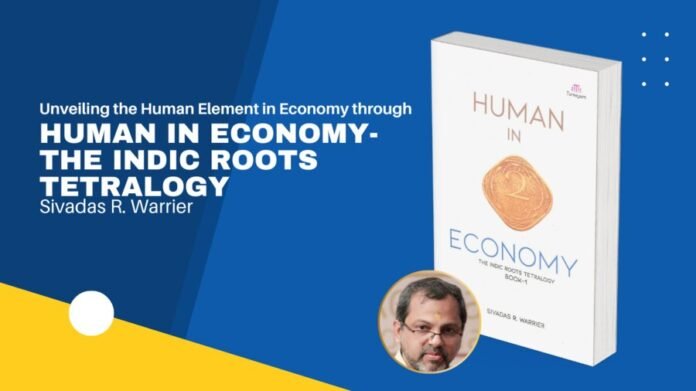Sivadas R. Warrier, a distinguished professional in the accounting and finance industry, brings a unique blend of management expertise and profound knowledge of Ayurveda. With over 15 years of experience, Warrier’s career spans notable stints on Dalal Street and at the Al Naboodah Group in Dubai. His current role as Director at The Arya Vaidya Pharmacy (Coimbatore) Ltd further enriches his multifaceted career. Warrier’s latest literary endeavor, “Human in Economy – The Indic Roots Tetralogy,” is a testament to his deep understanding of the intertwined nature of culture, civilization, and economics. This book offers a comprehensive exploration of the Indian economy’s evolution, emphasizing the inseparable human element that drives economic progress.
“Human in Economy – The Indic Roots Tetralogy” embarks on an enlightening journey through the history of the Indian economy. Warrier meticulously traces the growth of the economy from the pre-independence era to the dawn of the 21st century. The book delves into significant milestones, policy changes, and socio-economic transformations that have shaped India’s economic landscape.
Warrier begins by examining the pre-independence economic scenario, characterized by colonial exploitation and the struggle for economic self-sufficiency. He highlights the resilience of the Indian populace in the face of adversity, showcasing how traditional industries like textiles, agriculture, and trade formed the backbone of the economy. Warrier’s narrative seamlessly transitions into the post-independence period, where the nation embarked on a journey of economic reconstruction and development. He delves into the strategic initiatives taken by visionary leaders to build a self-reliant economy, emphasizing the importance of planned economic development and industrialization.
One of the most compelling aspects of Warrier’s work is his interpretation of the “human” element in the functioning of the economy. He argues that the economy is not merely a system of production and consumption but a reflection of the people who drive it. Warrier elucidates how human aspirations, values, and behaviors shape economic policies and outcomes.
Drawing on examples from diverse regions like Kongu Nadu and Cochin, Warrier illustrates the inseparability of culture and civilization from economics. He posits that the economic activities of a region are deeply influenced by its cultural heritage, social norms, and historical context. This perspective offers a nuanced understanding of economic development, highlighting the role of human agency in shaping economic destinies.
Warrier’s analysis of Kongu Nadu, a historically significant region in Tamil Nadu, underscores the interplay between traditional practices and modern economic activities. He delves into the region’s agrarian roots, entrepreneurial spirit, and adaptive strategies that have sustained its economic vitality. Similarly, his exploration of Cochin, a vibrant port city with a rich maritime history, reveals how trade, commerce, and cultural exchange have been integral to its economic growth.
“Human in Economy – The Indic Roots Tetralogy” underscores the inseparability of culture and economics. Warrier contends that economic systems cannot be understood in isolation from the cultural and civilizational context in which they operate. He argues that the economic decisions of individuals and communities are profoundly influenced by their cultural values, social structures, and historical experiences.
Warrier’s work highlights the importance of recognizing and preserving cultural heritage in the pursuit of economic development. He advocates for policies that are attuned to the cultural realities of regions, promoting inclusive and sustainable growth. By weaving together historical narratives, cultural insights, and economic analysis, Warrier provides a holistic perspective on the Indian economy.
Sivadas R. Warrier’s “Human in Economy – The Indic Roots Tetralogy” is a visionary contribution to the discourse on economic development. Through his meticulous research and insightful analysis, Warrier offers a fresh perspective on the Indian economy’s evolution. His emphasis on the human element and the inseparability of culture and economics enriches our understanding of economic processes. As a seasoned professional with a unique blend of management expertise and Ayurvedic knowledge, Warrier’s work is a testament to the power of interdisciplinary thinking. This book is a must-read for anyone interested in the intricate relationship between human civilization and economic progress.


